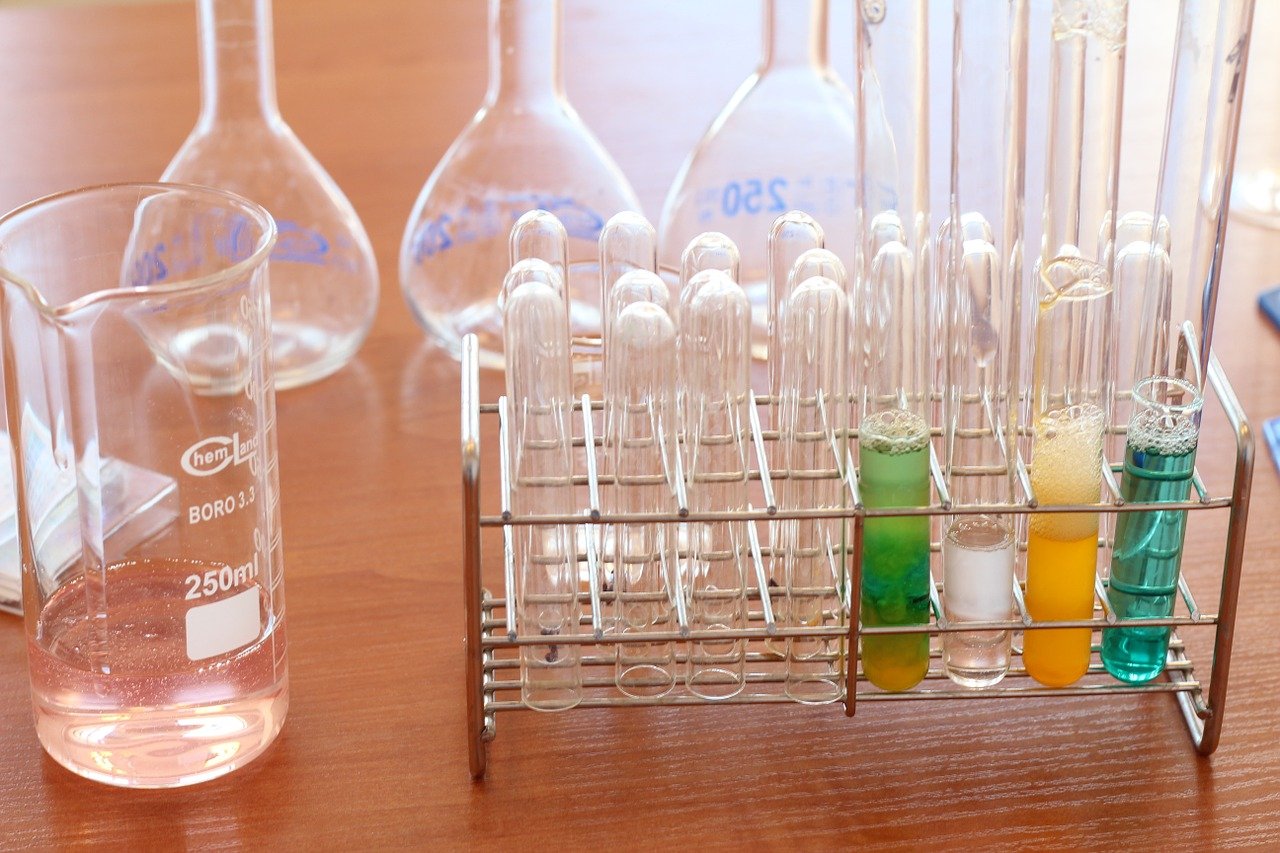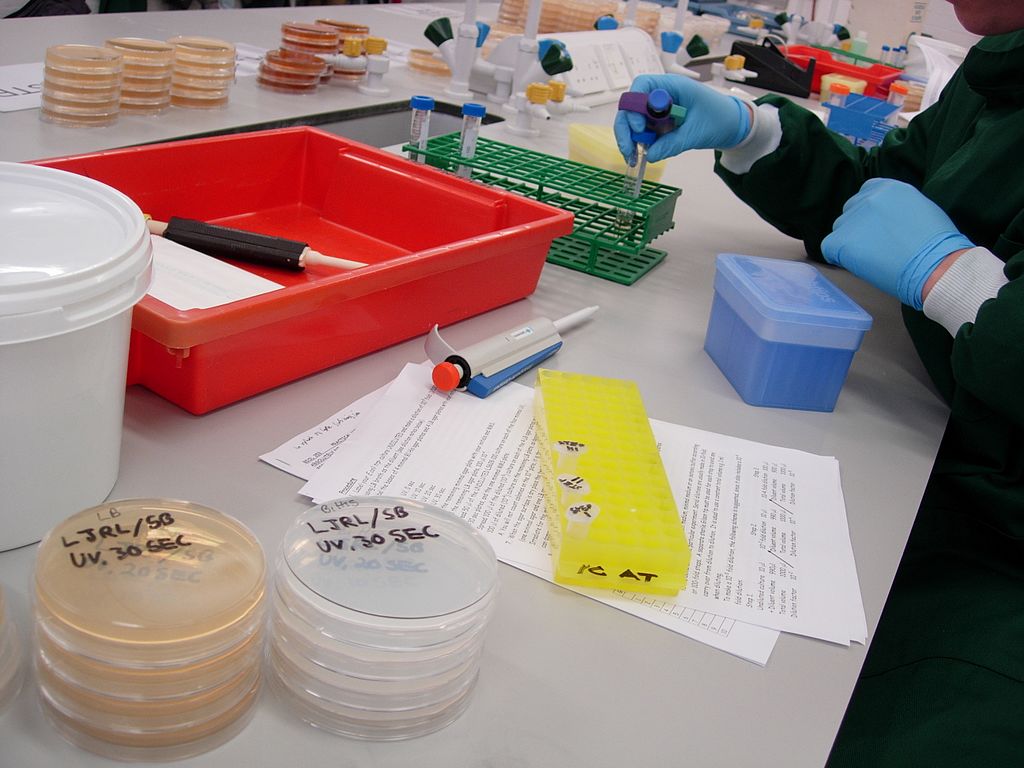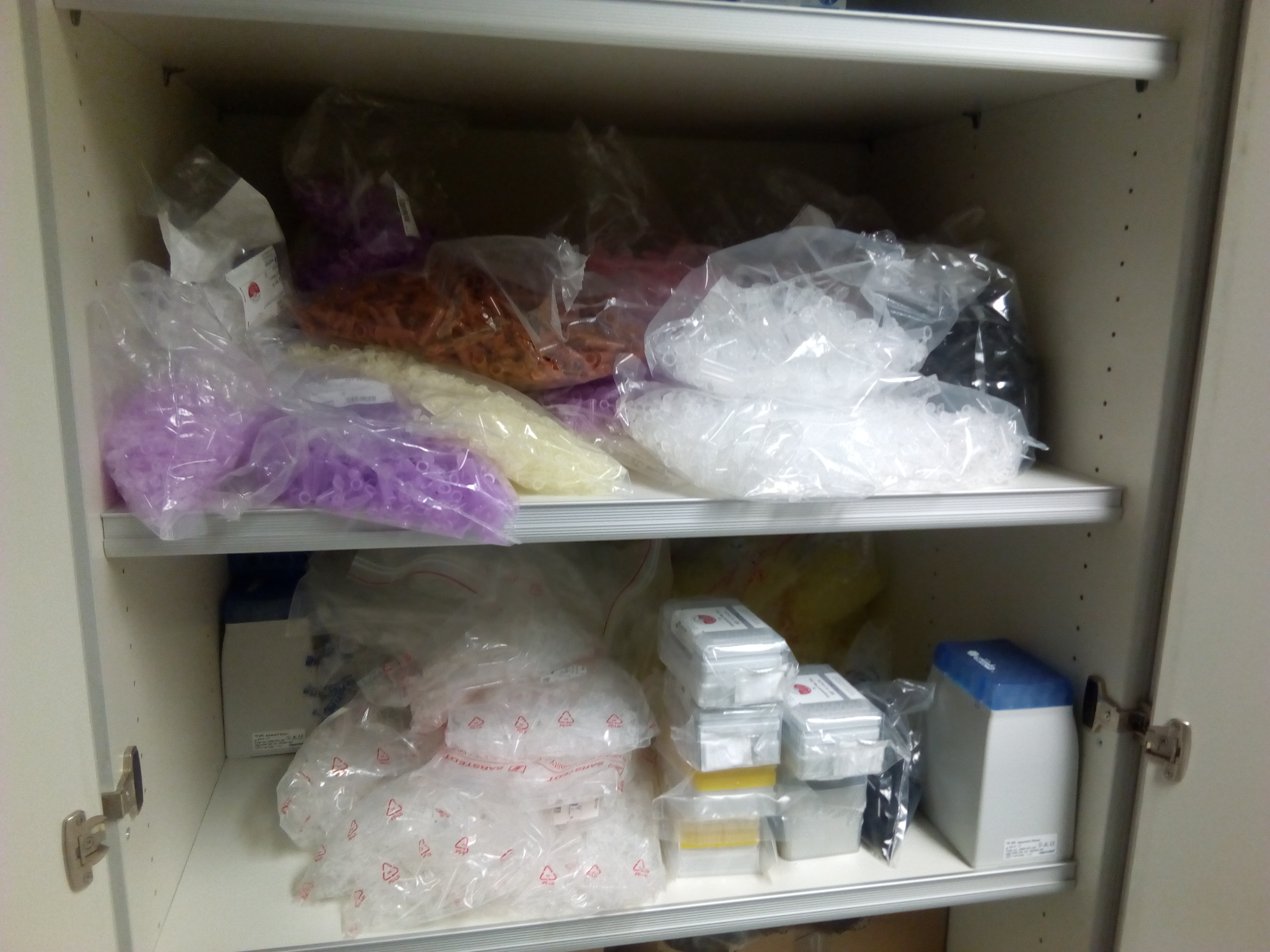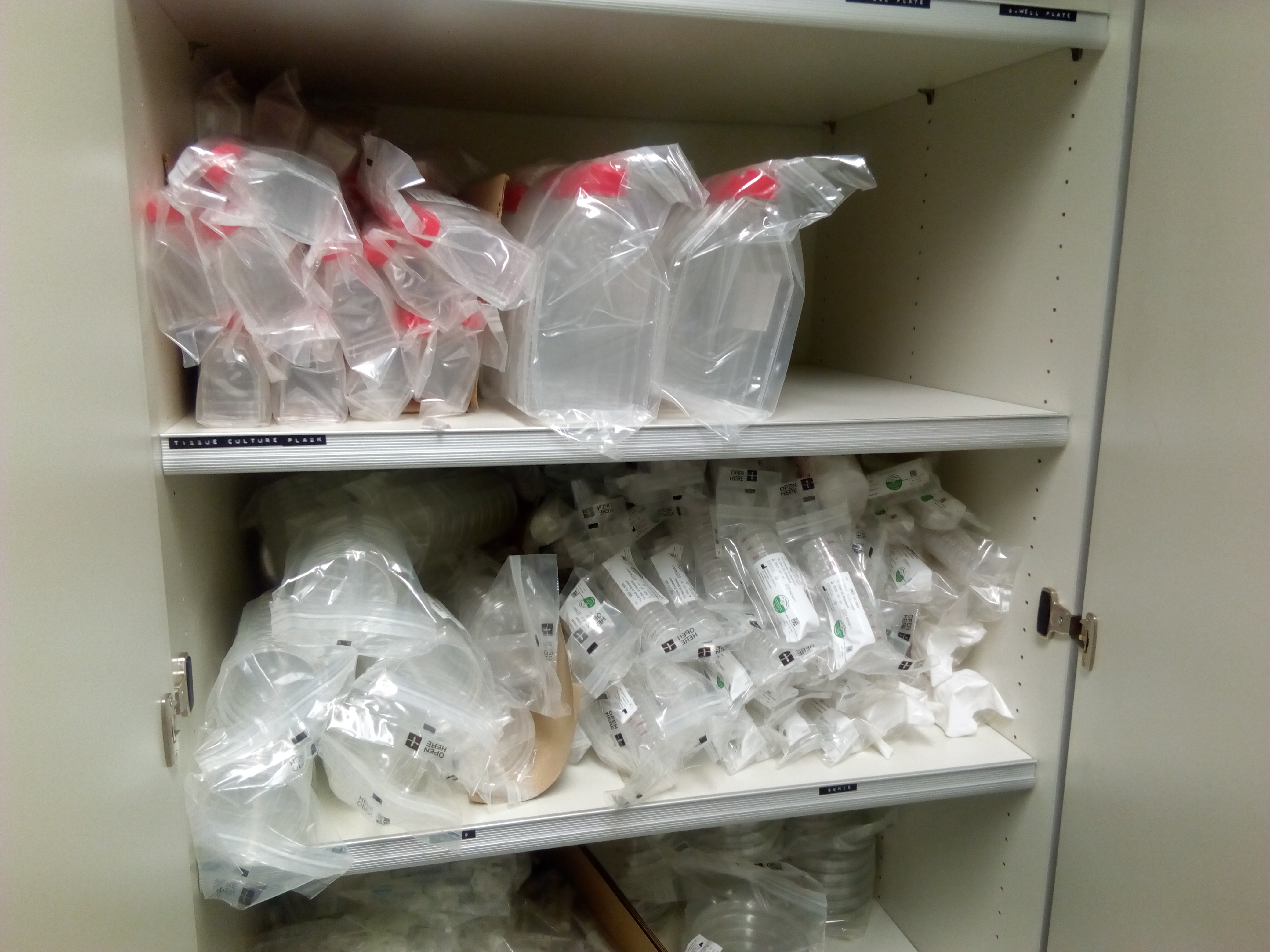The "plastic problem" of bioscience.
science·@sco·
0.000 HBDThe "plastic problem" of bioscience.
### Unnoticed by the general public, research produces large amounts of plastic waste. But are there alternatives? *** <sup>This is a translation of my [recent post](https://steemit.com/wissenschaft/@sco/das-plastik-problem-der-biowissenschaften-ger) that was originally written in german.</sup> ***  <sup>*How [pixabay](https://pixabay.com/de/labor-chemie-f%C3%A4cher-chemical-1009190/) (CC0) and the world believe that we are working...*</sup> # A personal problem As most of my readers know, I work as a scientist in a chemical/biological lab. And I love my work. Science may sometimes be tedious, demanding and marked by setbacks, but it is also exciting (at least from time to time). It may sound a bit exaggerated, but I am happy to be able to push the limits of human knowledge a little further with every small success, and I know that many of my colleagues feel the same way. This is was motivates us to pursue our job, even as we could earn more money elsewhere. However, the profession also has its **downsides**. One of them I write about today. For a start, let me tell you that most of us bioscientists are very well aware of the state of our planet. Among us you will not find many deniers of anthropogenic climate change, and many of us actively engage for environmental protection - which of course also includes the reduction or recycling of waste. Especially **plastic waste** poses great problems for the earth's ecosystems. The existence of huge plastic islands in the oceans is common knowledge, small particles, the so-called "microplastics", endanger fish and other aquatic animals, the chemicals released have an effect on the hormone balance and are therefore environmentally toxic ([I reported](https://steemit.com/de-stem/@sco/xenooestrogene-teil-4-plastik-wie-gesundheitsschaedlich-es-wirklich)), and also the proper disposal of polymers - burning - contributes to the increase in the CO<sub>2</sub> content of our atmosphere. And I don't even start talking about the oil and chemicals that are consumed in the production of plastics. It is no coincidence that politicians try to get rid of plastic bags by means of regulations, even if these often end counterproductively because of the prevailing incompetence (cardboard bags, for example, are only better if they are used several times). Once again: We scientists know all this and generally worry about these things. ### As long as it concerns leisure time. In the lab... Well... **Damn, how we produce dirty waste!** And by that I don't mean any chemicals at all. Contrary to popular belief, their consumption is barely perceptible compared to industry. No, it's actually about **plastic.**  <sup>*...and how we really work... by [Laurence Livermore](https://commons.wikimedia.org/wiki/File:Lancaster_University_Biology_253_Lab.jpg), CC-BY*</sup> # Why that? Life sciences in general and molecular biology in particular depend on disposable materials. Pipette tips, reaction vessels of all kinds, syringes, petri dishes and plastic bottles have many advantages over the glass products that scientists of old used: - **The cost.** If you take into account the amount of time spent washing dishes, glass does not pay off at all. Not to mention the purchase price. Since science is a highly competitive field that chronically suffers from underfunding, a decisive point. - "Stability." No breaking, no shards, no injuries, no trouble with lost samples. - "Sterility." It is extremely important for us not to introduce any bacteria, yeasts or other contaminations into our experiments, otherwise they would become unusable. Plastic can be purchased sterile or, if necessary, can be sterilized relatively easily by ourself (most common method: autoclaving, i.e. heating under steam pressure), whereas - due to the small size of our dishes - this is much more difficult with glass, especially after reuse. - "Size." Technology allows us to use ever smaller sample quantities for our experiments, which on the one hand reduces costs and on the other hand increases the "sample throughput", i.e. the quantity of samples that we can measure simultaneously. However, smaller volumes require us to work with ever smaller vessels. Due to their size, however, these are hardly or not washable, and glass is no longer suitable as a material. Ergo: Disposable plastic.  <sup>*...with plastic...*</sup> # The problem For these reasons, science consumes extreme amounts of plastics. It is estimated that **5.5 million tonnes** of plastic waste is produced annually by bioscientists worldwide, which is almost equal to the amount of plastic that is recycled annually worldwide <sup>[ref](https://phys.org/news/2015-12-scientists-reduction-plastic-lab.html)</sup> and accounts for almost 2% of global plastic waste.<sup>[ref](http://www.worldwatch.org/global-plastic-production-rises-recycling-lags-0)</sup> And that's a problem we care about. Several calls and comments published in top journals such as Nature over the last years show that the topic is certainly being discussed in the community. According to the authors, science should be pioneering in environmental protection, and not the very last to jump on the "sustainability bandwagon".<sup>[ref1](https://www.nature.com/articles/502170a), [ref2](https://www.nature.com/articles/528479c)</sup> **And of course, I fully agree...** But what to do? # Solutions Unfortunately, there are not too many ideas on how to escape dependence on disposable plastics. ### Financial "candy" In their Nature article, Urbina et al. propose that research funding should provide financial incentives for sustainability when paying for projects. <sup>[ref](https://www.nature.com/articles/528479c)</sup> *Hmmm, yeah, but...*", says the learned skeptic in my head... "*nice idea. But __if research becomes more expensive, fewer projects can be financed__*." It's not to be expected that governments - in the age of ever shrinking budgets - will suddenly discover their love for science and come up with additional research budgets. And no scientist I know would want to accept not getting a grant just so that others can run their projects cleaner and greener. ### Open the eyes Of course, you can start with yourself. We are so used to disposable products in our daily lab routine that we often don't even think about taking glass instead. Hell, I don't even know where to find half of the glassware in my own lab. But it isn't necessary to use 50 ml Falcons for medium when there are sterilized glass Duran bottles available. It's not necessary to use a new tip for pipetting every time, and one can save plastics wherever possible. **Self-responsibility.** Most of us could save a little, let's say 10%, of disposables without much problems. But then, on the other hand, that means the remaining **90% are still necessary** for research to work properly. I.e., even if all researchers would pull themselves together, we would still produce a relatively sick amount of waste. ### Management As Lopez et al. also suggest, we can contribute to the development of concepts to reduce the consumption of disposable goods at the management level.<sup>[ref](https://www.ncbi.nlm.nih.gov/pmc/articles/PMC5548370/)</sup> Sure, a little more is always possible. But as long as costs, time and practical reasons are favouring plastics, this imo does not substancially change our dilemma. ### Stop the research. A point for the very funny ones of my readers. The production of 5.5 M tons of plastic waste a year is still MUCH better than stopping curing diseases and advancing humanity. My opinion.  <sup>*...and plastic!*</sup> # Conclusion I have written this article (quite self-critically), although I know that it is water on the mills of those who are to be had for everything they consider "natural", and who think science is the devil's work. But I am firmly convinced that we must also talk about this topic. We are not allowed to measure with double standards, we are committed to correctness, even when it concerns ourselves. On the one hand, we researchers have to pull ourselves together and reduce our waste by the 10-20% (pure estimation on my part) which is probably possible without quality losses. **But above all, we need technological solutions** that combine the financial and material benefits of disposable products with sustainable usability. Who should invent them, if not we ourselves? If anyone of you, dear readers from related disciplines, has an idea on how to solve the problem, just bring it on. I even think there's not too little money in a good solution, so you could combine doing good with lambo! *** *** *Disclaimer: In my blog, I'm stating my honest opinion as a researcher, not less and not more. Sometimes I make errors. Discuss and disagree with me - if you are bringing the better arguments, I might rethink.* <img src="https://vg07.met.vgwort.de/na/07958098767143d3b0e9791027bd2a33" width="1" height="1" alt="" />
👍 evo69, hackerzizon, derbesserwisser, tfcoates, hariram9, curbot, flugschwein, serialfiller, theodora.austria, casperado, serylt, humanduck, sbi2, perpetuum-lynx, arcange, sco, lauch3d, steemkinderkanal, magicquokka, dedicatedguy, vladimir-simovic, raphaelle, alexs1320, scienceangel, lesshorrible, shaka, cj3000, smallstepschange, fr4mer, soulesque, vjap55, council, felixxx, snurk, replichara, rilc0n, jaycem, alexdory, jidgabol, fragmentarion, germansailor, communityisyou, educatie, medicnet, sensation, astrophoto.kevin, huch, quekery, lianaakobian, allhailfish, weitblicker, tobixen, john.difool, scienceblocks, mathowl, bloom, variola, steemarity, berndpfeiffer, limesoda, ufv, robotics101, lemouth, steemstem, lesmouths-travel, justtryme90, alexzicky, stem.witness, borislavzlatanov, rwilday, wildtrader, nicholaspang, suesa, paddlereunion, erh.germany, anggaariska, onepracticalcat, traviseric, alexworld, boutscher, liameth, ari16, beautyinscience, helo, mahdiyari, jpederson96, tanyaschutte, felixrodriguez, enzor, delin.english, eleonardo, adetola, rharphelle, shoganaii, jlmol7, mittymartz, olajidekehinde, rionpistorius, ajpacheco1610, anyes2013, effofex, count-antonio, de-stem, dman-dmania, scottallen, kevinwong, foundation, alexander.alexis, ludmila.kyriakou, howo, tsoldovieri, himal, esteemguy, mr-aaron, fbslo, tristan-muller, fejiro, terrylovejoy, real2josh, kingabesh, magatha, michaelwrites, deholt, temitayo-pelumi, osakuni, reyvaj, purelyscience, drmoises, osariemen, swapsteem, javier.dejuan, clamp-loader, lamouthe, kryzsec, fancybrothers, pratik27, greatwarrior79, marcuz, ibk-gabriel, herbayomi, dna-polymerase, dna-ligase, dna-helicase, dna-primase, sliding-clamp, dna-gyrase, rna-polymerase, ribosome, ozgurcinarli, bistonic, rachelsmantra, kerriknox, gra, rockeynayak, mountain.phil28, steemzeiger, funster, tombstone, arconite, croctopus, biomimi, testomilian, mrwang, nurhayati, sci-guy, amavi, kenadis, fredrikaa, abigail-dantes, zeeshan003, dexterdev, supposer, zest, cryptoitaly, rosatravels, drsensor, damzxyno, outtheshellvlog, stayoutoftherz, abdulmath, robertbira, eurogee, kelos, aamin, langford, steepup, vanessahampton, forestplane, tking77798, anevolvedmonkey, theironfelix, dirge, co-in, chappertron, lafona-miner,